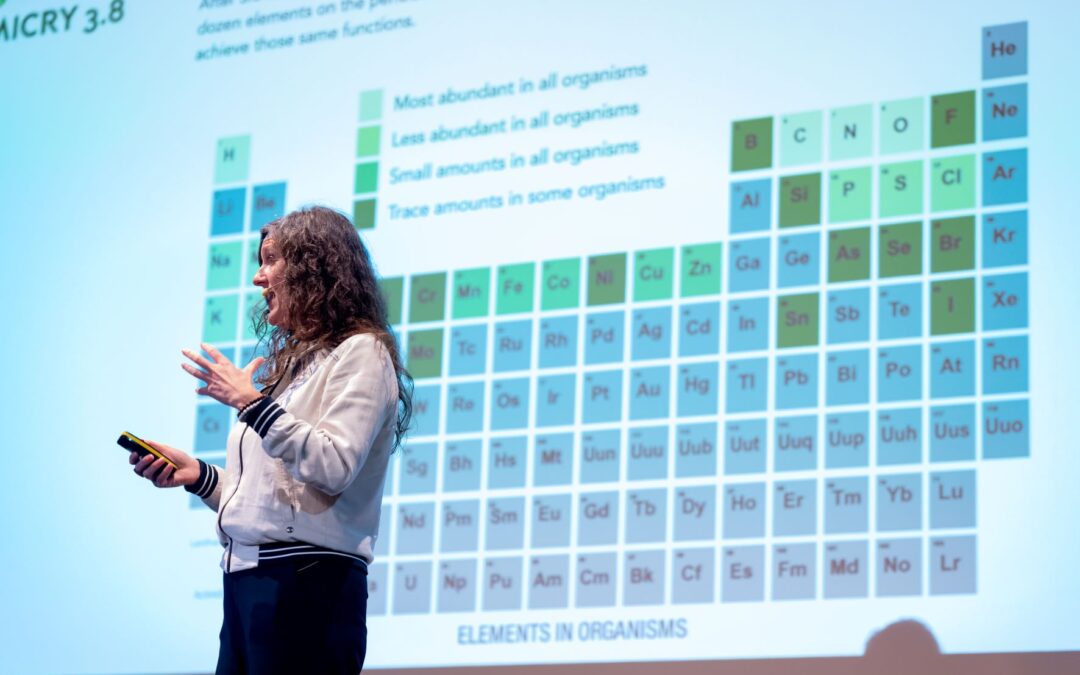- The 1st International Ecoislas Forum opened today’s sessions with Leen Gorissen, biologist specialised in ecology, regenerative design and bio-inspired innovation and founder of Centre4NI.
- Today’s programme will also feature Cristian Felber’s plenary session, along with a number of other parallel sessions
On the second day, the first International Ecoislas Forum began its morning programme with a plenary session led by Leen Gorissen, biologist specialised in ecology, regenerative design and bio-inspired innovation and founder of Centre4NI. She explained how nature is the key to our planet’s future. “Nature has been evolving and living among us for 3.8 billion years, offering an undeniable example of continuous innovation, adaptation and regeneration. Natural intelligence will save our future”.
We can already find some real examples of this natural intelligence: companies that “grow bricks” for the construction of their buildings, a way to manufacture cement which mimics the way that corals build reefs, green roofs that are capable of regulating temperature, spider silk‐inspired artificial fibres, forest floor carpets, and more. “We need to use this intelligent nature and its logic to create the planet we need, one that is better than the one we found,” she says.
In nature “everything is reusable and recyclable, nothing is used just once”, and it has been so for “billions of years, without causing degradation or pollution”, so the challenge for humans is “to recycle completely”, resulting in a radical change that involves redesigning entire cities.
In this vein, Leen Gorissen has taken a deeper look into the regenerative capacity of nature, stating that it is “time to expand the concept of intelligence to include natural intelligence”, which is synonymous with “surviving and thriving amidst constant changes and limited resources”. The question she posed is: “How can we innovate in a way that will benefit future life, not just human life but all life on Planet Earth?”. The only way to safeguard our future is to take firm and determined actions so as “not to be part of the destruction of our planet”, and this premise that “seemed crazy at first, is now a reality”, as demonstrated by companies all around the world operating with “near-zero emissions”.
For Leen Gorissen, at this critical moment of climate crisis “it is time to learn from those who built the world and find the necessary exchange of values and roles to make peace with the Earth” because “the future of nature is our future”.
The environment as a right
The Canarias Room at Infecar also hosted the session on ‘Ecoislas: The Challenge of the Future’, a round table where the islands of Gran Canaria and Mallorca shared experiences and synergies and reflected on these challenges from an island perspective.
Inés Miranda, Regional Minister for Territorial Policy and Landscape at the Cabildo de Gran Canaria, highlighted that the new Island Management Plan (PIOGC), which has recently been approved, is a step forward in the Eco-island model that the island government has been advocating since 2015. “The way we see it, and the way we have expressed this, is that its uses must be defined and useful to respond to the needs of the people and the economic development of the island”, based on social justice and the environment, which is to be understood as “as a human right that must be respected and enforced”.
Among the fundamental and cross-cutting aspects of this model, she stressed the importance of landscape, because “in addition to economic development, the landscape is what residents and visitors perceive, and what will ensure that tourism remains sustainable and on the right track”. Tourism must change in order to “care for and enhance” the environment, which is why she believes renovation rather than new land occupation is key, and advocates for a “sustainable tourism model that is distinctive”.
As an example, she cited the north and northwest of Gran Canaria, which are moving towards a “different” tourism development that leaves behind “tourist resorts and traditional tourist development for a new model that leverages existing resources and features constructions that reflect Gran Canaria’s culture and architecture”. The island firmly supports nature hotels, dismantlable and reusable structures, and “careful” planning to ensure the survival of the primary sector.
In this regard, Raúl García Brink, Technical Coordinator of Economic Development, Energy Sovereignty, Climate and Knowledge at the Cabildo de Gran Canaria, highlighted agrivoltaics as an innovative solution with great results. “If the land used for agriculture was combined with photovoltaic production”, this would result in “higher crop yields and an interesting additional income for producers”.
He also noted that the island “is not going to become a laboratory of innovation in ecological transition, it already is one”. An example of this are desalination plants powered with sea-generated energy or with pioneering offshore projects. For the Technical Coordinator of Energy Sovereignty of the Cabildo de Gran Canaria, the energy communities have made it possible to “democratise and decentralise the island’s energy model” with “shared self-consumption”, which makes “a big difference”.
Aurora Ribot, Regional Minister for Sustainability and Environment at the Consell de Mallorca, the Mallorca Island Council, congratulated Gran Canaria for its commitment to an eco-island model, which is something they share and towards which they are also moving by implementing new measures. “In the Balearic Islands, we have understood that tourism models must continue to be compatible with life and sustainable in the long term” and to achieve this “these models need to change and get away from the current predatory tourism monoculture that socially strains the population”. In the Balearic Islands, we decided to “set limits” because it was time to choose “whether to create new roads or infrastructures to keep welcoming tourists or to move towards the eco-island we want”.
Evening session
The first International Ecoislas Forum will feature a plenary session led by Christian Felber, proponent of the Economy for the Common Good, along with a number of parallel sessions and working groups which will take place throughout this final day. This first edition of the Ecoislas Forum opened its doors on Thursday and welcomed more than 60 speakers from the academic, administrative, financial, business and social sectors. Its aim is to become a space for discussion, proposals, and the promotion of measures to enhance the transition towards a more profitable, more self-sufficient, more sustainable and more environmentally friendly socio-economic model; with a specific focus on islands.

